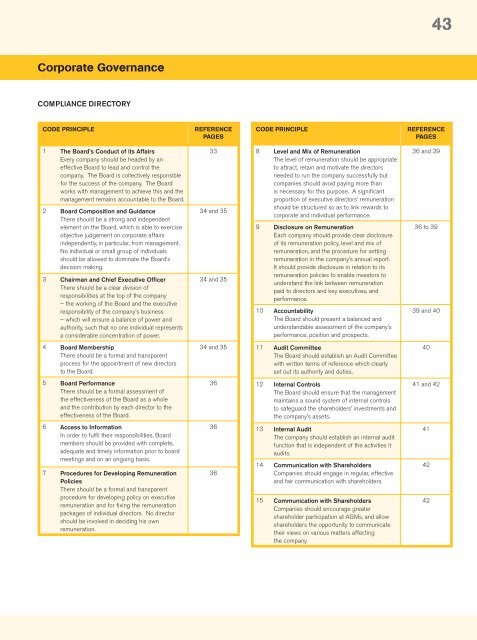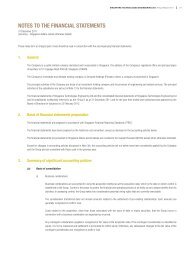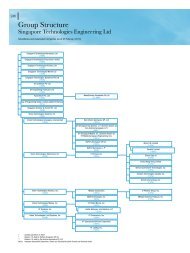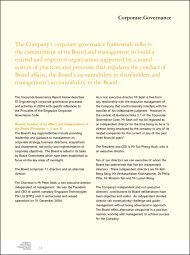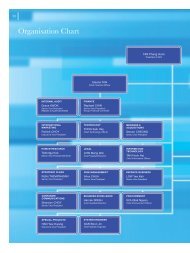Full Annual Report 2006 - Singapore Technologies Engineering
Full Annual Report 2006 - Singapore Technologies Engineering
Full Annual Report 2006 - Singapore Technologies Engineering
Create successful ePaper yourself
Turn your PDF publications into a flip-book with our unique Google optimized e-Paper software.
43<br />
Corporate Governance<br />
COMPLIANCE DIRECTORY<br />
CODE PRINCIPLE<br />
REFERENCE<br />
PAGES<br />
CODE PRINCIPLE<br />
REFERENCE<br />
PAGES<br />
1 The Board’s Conduct of its Affairs<br />
Every company should be headed by an<br />
effective Board to lead and control the<br />
company. The Board is collectively responsible<br />
for the success of the company. The Board<br />
works with management to achieve this and the<br />
management remains accountable to the Board.<br />
2 Board Composition and Guidance<br />
There should be a strong and independent<br />
element on the Board, which is able to exercise<br />
objective judgement on corporate affairs<br />
independently, in particular, from management.<br />
No individual or small group of individuals<br />
should be allowed to dominate the Board’s<br />
decision making.<br />
3 Chairman and Chief Executive Officer<br />
There should be a clear division of<br />
responsibilities at the top of the company<br />
– the working of the Board and the executive<br />
responsibility of the company’s business<br />
– which will ensure a balance of power and<br />
authority, such that no one individual represents<br />
a considerable concentration of power.<br />
33<br />
34 and 35<br />
34 and 35<br />
8 Level and Mix of Remuneration<br />
The level of remuneration should be appropriate<br />
to attract, retain and motivate the directors<br />
needed to run the company successfully but<br />
companies should avoid paying more than<br />
is necessary for this purpose. A significant<br />
proportion of executive directors’ remuneration<br />
should be structured so as to link rewards to<br />
corporate and individual performance.<br />
9 Disclosure on Remuneration<br />
Each company should provide clear disclosure<br />
of its remuneration policy, level and mix of<br />
remuneration, and the procedure for setting<br />
remuneration in the company’s annual report.<br />
It should provide disclosure in relation to its<br />
remuneration policies to enable investors to<br />
understand the link between remuneration<br />
paid to directors and key executives, and<br />
performance.<br />
10 Accountability<br />
The Board should present a balanced and<br />
understandable assessment of the company’s<br />
performance, position and prospects.<br />
36 and 39<br />
36 to 39<br />
39 and 40<br />
4 Board Membership<br />
There should be a formal and transparent<br />
process for the appointment of new directors<br />
to the Board.<br />
34 and 35<br />
11 Audit Committee<br />
The Board should establish an Audit Committee<br />
with written terms of reference which clearly<br />
set out its authority and duties.<br />
40<br />
5 Board Performance<br />
There should be a formal assessment of<br />
the effectiveness of the Board as a whole<br />
and the contribution by each director to the<br />
effectiveness of the Board.<br />
36<br />
12 Internal Controls<br />
The Board should ensure that the management<br />
maintains a sound system of internal controls<br />
to safeguard the shareholders’ investments and<br />
the company’s assets.<br />
41 and 42<br />
6 Access to Information<br />
In order to fulfil their responsibilities, Board<br />
members should be provided with complete,<br />
adequate and timely information prior to board<br />
meetings and on an ongoing basis.<br />
7 Procedures for Developing Remuneration<br />
Policies<br />
There should be a formal and transparent<br />
procedure for developing policy on executive<br />
remuneration and for fixing the remuneration<br />
packages of individual directors. No director<br />
should be involved in deciding his own<br />
remuneration.<br />
36<br />
36<br />
13 Internal Audit<br />
The company should establish an internal audit<br />
function that is independent of the activities it<br />
audits.<br />
14 Communication with Shareholders<br />
Companies should engage in regular, effective<br />
and fair communication with shareholders.<br />
15 Communication with Shareholders<br />
Companies should encourage greater<br />
shareholder participation at AGMs, and allow<br />
shareholders the opportunity to communicate<br />
their views on various matters affecting<br />
the company.<br />
41<br />
42<br />
42


